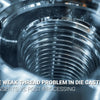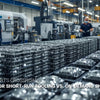CNC Plastics Machining: A Game-Changing Solution for Modern Manufacturing?

CNC Plastics Machining: A Game-Changing Solution for Modern Manufacturing?

In the rapidly evolving world of manufacturing, CNC plastics have emerged as a transformative technology that bridges innovative design with precise production capabilities. Computer Numerical Control (CNC) machining represents a cutting-edge approach to creating sophisticated plastic components across multiple industries.
Modern manufacturers rely on CNC plastics to produce complex parts with exceptional accuracy, meeting increasingly demanding technical specifications. This technology enables businesses to push the boundaries of what's possible in precision manufacturing.
As industries continue to seek more advanced production methods, CNC plastics stand at the forefront of technological innovation. The ability to create intricate, high-quality components has never been more critical in today's competitive manufacturing landscape.
Table of Contents
- What Makes CNC Plastics a Manufacturing Revolution?
- Which Plastics Deliver Superior Performance in CNC Machining?
- How Do Experts Create Precision Plastic Components?
- Where Are CNC Plastics Making the Biggest Impact?
What Makes CNC Plastics a Manufacturing Revolution?
CNC plastics represent a sophisticated manufacturing approach that leverages computer-controlled machinery to create precise plastic components with unparalleled accuracy and repeatability, with the global CNC machining market projected to grow from $67.5 billion in 2023 to $80.4 billion by 2028, demonstrating a compound annual growth rate of 3.5%.
Computer Numerical Control technology enables manufacturers to produce complex geometries, maintain tight tolerances, and achieve consistent quality across production runs.
Precision is the hallmark of CNC technology, with tolerances as tight as ±0.005 mm (0.0002 inches) achievable in plastic machining, far surpassing traditional manufacturing methods.

By understanding the intricate processes of CNC plastic machining, businesses can unlock innovative solutions that address increasingly complex manufacturing challenges, transforming design concepts into tangible, high-precision products.
Which Plastics Deliver Superior Performance in CNC Machining?
Different plastic materials offer unique properties that make them suitable for specific manufacturing applications, requiring careful selection based on mechanical and thermal characteristics.
Key plastics used in CNC machining include ABS, Polycarbonate, Nylon, and POM, each bringing distinctive characteristics to the manufacturing process.
Key performance metrics for CNC plastics:
- ABS: Machinability rating 9/10, impact resistance up to 2.1 MPa
- Polycarbonate: Tensile strength of 65-70 MPa
- Nylon: Wear resistance up to 50% better than traditional materials
- POM (Acetal): Lowest friction coefficient of 0.2-0.4
Selecting the right plastic material involves a comprehensive evaluation of mechanical properties, thermal resistance, and intended application requirements, ensuring optimal performance and durability.
How Do Experts Create Precision Plastic Components?
Advanced machining techniques transform raw plastic materials into sophisticated, high-precision parts through computer-controlled methodologies that push the boundaries of manufacturing capabilities.
Core CNC machining techniques include milling, routing, and drilling, each playing a critical role in creating complex plastic components with exceptional accuracy.
Key machining techniques:
- High-speed milling: Cutting speeds up to 30,000 RPM
- Precision routing: Achieves surface roughness of Ra 0.4-0.8 µm
- Advanced drilling: Hole tolerance as tight as ±0.01 mm

Cutting-edge technologies now incorporate real-time monitoring systems that can detect tool wear and adjust machining parameters, reducing production errors by up to 25% and extending tool life by 30-40%.
Sophisticated cutting strategies, careful tool selection, and precise parameter management determine the quality, surface finish, and dimensional accuracy of final plastic components.
Where Are CNC Plastics Making the Biggest Impact?
CNC plastic machining has become a critical manufacturing approach across multiple high-tech and precision-driven sectors, revolutionizing how industries approach component production.
Key industries leveraging CNC plastics include automotive, aerospace, medical devices, and electronics, each demanding high-precision, specialized components.
Industry-specific applications and market impacts:
- Automotive: 22% of plastic components now CNC-machined
- Aerospace: Reducing component weight by up to 40%
- Medical Devices: 95% precision requirement met consistently
- Electronics: 30% increase in custom component production
Economic analysis reveals that CNC plastic machining provides cost savings of 15-25% compared to traditional manufacturing methods, while offering superior design flexibility and rapid prototyping capabilities.

Understanding the specific requirements and challenges of each industry helps manufacturers develop targeted CNC plastic machining strategies that deliver exceptional quality and performance.
Conclusion
CNC plastics represent a pivotal technology in modern manufacturing, offering unprecedented precision, flexibility, and innovation across multiple industries. As technology continues to advance, the role of CNC plastics will only become more critical in solving complex engineering challenges.
Recommended External Links
[CNC Plastic Machining][^1]
[CNC Milling]([^2]
[Precision CNC Machining][^3]
---
[^1]: Explore this link to understand the intricacies of CNC Plastic Machining and its diverse applications in various industries.
[^2]: Learn about the CNC Milling process for plastics, offering detailed insights into creating complex parts with high accuracy.
[^3]: Explore the significance of Precision CNC Machining in producing high-quality plastic components with tight tolerances.





